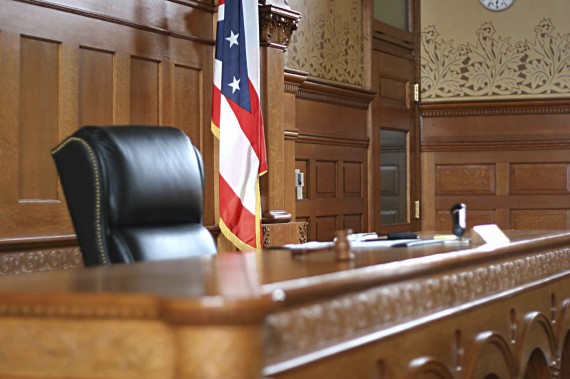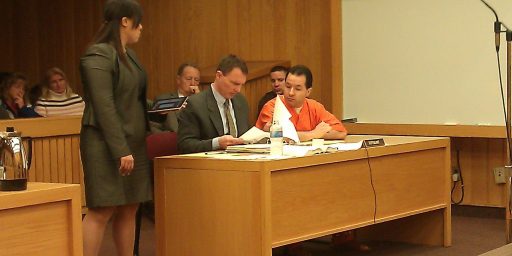Are Plea Bargains A Deal With The Devil?
Usually, Defendants plead guilty for perfectly rational reasons.
In the July issue of Reason, Timothy Lynch lays out an argument against the method by which the vast majority of criminal cases are resolved in the United States:
Criminal cases rarely go to trial, because about 95 percent are resolved by plea bargains. In a plea bargain, the prosecutor usually offers a reduced prison sentence if the defendant agrees to waive his right to a jury trial and admit guilt in a summary proceeding before a judge.
This standard operating procedure was not contemplated by the Framers. The inability to enter into plea arrangements was not among the grievances set forth in the Declaration of Independence. Plea bargaining was not discussed at the Constitutional Convention or during ratification debates. In fact, the Constitution says “the Trial of all Crimes, except in Cases of Impeachment; shall be by Jury.” It is evident that jury trials were supposed to play a central role in the administration of American criminal justice. But as the Yale law professor John Langbein noted in a 1992 Harvard Journal of Law and Public Policy article, “There is an astonishing discrepancy between what the constitutional texts promise and what the criminal justice system delivers.”
Right off the bat, I’ve got to say that this is a silly argument. The fact that plea bargaining wasn’t mentioned in the Constitution, or that the Bill of Rights contains explicit guarantees of the right against self-incrimination, the right to counsel and to confront witnesses, and the right to a jury trial, is largely irrelevant in a discussion about whether or not it is a proper practice, or a good idea. Moreover, the suggestion that the practice of plea bargaining is somehow unconstitutional, which this part of Lynch’s argument seems to suggest is just absurd. There’s nothing in the Constitution that prevents a Defendant from agreeing to waive his 5th, 6th, or 7th Amendment rights and plead guilty to a crime rather than risk going to trial.
Lynch goes on to paint what I think is a rather distorted view of both the plea bargaining process, and the reasons that both a prosecutor and a defendant would enter into a plea agreement:
No one ever proposed a radical restructuring of the criminal justice system, one that would replace jury trials with a supposedly superior system of charge-and-sentence bargaining. Like the growth of government in general, plea bargaining slowly crept into and eventually grew to dominate the system.
From the government’s perspective, plea bargaining has two advantages. First, it’s less expensive and time-consuming than jury trials, which means prosecutors can haul more people into court and legislators can add more offenses to the criminal code. Second, by cutting the jury out of the picture, prosecutors and judges acquire more influence over case outcomes.
From a defendant’s perspective, plea bargaining extorts guilty pleas. People who have never been prosecuted may think there is no way they would plead guilty to a crime they did not commit. But when the government has a “witness” who is willing to lie, and your own attorney urges you to accept one year in prison rather than risk a 10-year sentence, the decision becomes harder. As William Young, then chief judge of the U.S. District Court in Massachusetts, observed in an unusually blunt 2004 opinion, “The focus of our entire criminal justice system has shifted away from trials and juries and adjudication to a massive system of sentence bargaining that is heavily rigged against the accused.
What Lynch completely misses here are the advantages to a Defendant that come from plea bargaining. The most obvious one is a sentence that is typically substantially lighter than what they might get if they went to trial and were found guilty. Additionally, though, a Defendant might decide to plead guilty in order to avoid legal fees that they cannot afford (although this doesn’t come into play when a court-appointed attorney is involved, obviously), or in order to avoid having the embarrassing details of a case become public. Additionally, it’s often the case that the charge that a Defendant pleads guilty to is a lesser charge than what they were charged with, or what they could potentially be convicted of if they went to trial. A plea deal that allows a Defendant to avoid a felony conviction and plead guilty to a misdemeanor is, in many cases, a deal that’s too good to say no to. Similarly, it’s not uncommon for some first-time misdemeanors to be resolved with a disposition that results in all charges being removed from a Defendants record if they don’t commit another crime over a certain period of time. Again, most Defendants would be foolish not to accept that kind of a deal. Lynch’s assertion that Defendants are always the suckers in a plea bargain deal simply isn’t true.
Are there abuses in the plea bargaining system? No doubt, yes there are. One could argue that court-appointed attorneys, for example, have an incentive to pressure their clients into accepting quick plea deals because they lose money the more time they spend on a case. Similarly, prosecutors sometimes use the threat of felony charges that might not hold up at trial to force a plea to a misdemeanor. On the whole, though, it’s been my experience that the pleas that are struck, especially in the “small potatoes” cases are fair and very generous to Defendants.
There’s a final argument about plea bargaining that Lynch addresses, but dismisses derisively:
The most common apologia for plea bargaining is a pragmatic argument: Courthouses are so busy that they would grind to a halt if every case, or even a substantial share of them, went to trial. But there is nothing inevitable about those crushing caseloads. Politicians chose to expand the list of crimes, eventually turning millions of Americans into criminals. Ending the disastrous war on drugs would unclog our courts in short order.
In any case, trials are one of the few things the government indisputably should be spending money on. If additional funds are needed, free them up by stopping the nation-building exercises abroad and the corporate welfare here at home. The administration of justice ought to be a top priority of government.
This is all true, and its absolutely true that criminal courtrooms across the country are filled with people charged with petty drug possession offenses that ought not to be dealt with by the courts at all. That, however, is an argument against the War On (Some) Drugs, not an argument against the right of a Defendant to decide to resolve the case against him by making an agreement rather than risking a trial.






On the contrary, those are very important factors to consider. Think about it this way: if the prosecutor said, “Confess to this crime or I’ll have you tortured,” that would pretty obviously be a coerced confession and thus a violation of the right against self-incrimination. It’s certainly arguable (and I think persuasively so) that “Confess to this crime or I’ll charge you with a worse one and send you to prison for a longer time,” is also a coercive act in violation of that right.
The framers understood and were concerned that listing enumerated rights in the Bill of Rights risked overlooking important rights that they hadn’t thought needed protected. Thus the Ninth Amendment:
“The enumeration in the Constitution of certain rights shall not be construed to deny or disparage others retained by the people.”
I would go further and argue that not only is there no right so important that it’s owner cannot waive it; a fundamental part of owning a right is the ability to waive or negotiate it for value. I think the implicit argument Lynch is making is that the right to a jury should not be considered an individual right, but a collective responsiblity of the government.
The real beneficiary of the plea bargain system is the government. The government cannot try all the cases charged before it, and if it did, the system would fall apart.
It is common practice for prosecutors that if a defendant does not plead out, they will charge with all possible offenses available to them, or charge offenses that carry a mandatory minimum sentence. Thus, even if you are innocent, would you rather plead guilty to a lesser charge to avoid incarceration, or run the risk of facing charges that carry more jail time or mandatory time?
Rightly or wrongly, prosecutors also rely on the belief that judges will impose a more severe sentence after conviction, than any sentence offered at a plea bargain. This is especially true in the federal system where judges have allowed themselves to be dictated as to what the sentences will be by the federal sentencing guidelines.
The result is you have a criminal justice system that instead of allocating its precious resources in pursuing a drug kingpin, it is easier and more politically expedient to arrest a dozen street dealers or “runners” and claim the system has cleaned up the streets.
I have no problem with the plea agreement system, but let us not delude ourselves. The greater benefit of this bargain rests with the state and not the defendant.
Plea bargains are a benefit to the government, in that it saves cost and to the criminal, in that they can negotiate for a lesser charge/sentence. Isn’t there also a provision of easier sentencing if they defendant pleas early before the government has incurred the cost of preparing for trial?
However, the innocent are at a disadvantage as they aren’t getting off easier and a trial by jury is very much a wild card. And, of course, there is the citizen who has fallen into the clutches of the legal system through some single error. The one who doesn’t understand that a guilty plea has very deep costs to those in the legitimate society such as loss of employment, loss of credit, loss of family, loss of community, etc. Cutting their losses sometimes has a very high price.
Yeah like being overcharged to the point where pleading to a lesser offense makes sense. Basically, it amounts to, plead to a lesser offense or we throw everything at you including the kitchen sink. Risk facing enormous time behind bars, or take a smaller amount of time for certain.
The problem isn’t pleas bargains themselves, so much a plea bargains combined with habitual overcharging by prosecuters and “testi-lying” by law enforcement and forensics witnesses. Even if completely innocent, you’re often left with a choice of admitting guilt or risking a ridiculously long prison term in a rigged trial.
Choosing the guilty plea in the situation may certainly be rational response, but that doesn’t change the fact it’s the rational response to a system set up to punish anyone who asserts their rights.
To echo what has been already said, the problem isn’t the plea bargaining system in itself. The problem is that Prosecutors, as a rule, will throw the kitchen sink at you to try to coerce you into a plea. And if you don’t take a plea, the prosecutor and the judge will both go after you with guns blazing for making their lives difficult. How dare you actually make them go through a trial? All of this would be so much easier if you just plead guilty (which we already know you are, I mean, you wouldn’t have been arrested otherwise right?) /snark
Well, we have 4 comments pointing to over charging as a problem. Two that are about finer points of the law and not really all that interesting (sorry PD), and the last two that points out that plea bargaining is something good for the state and not necessarily the defendant.
Doug,
Care to reply at all to defend your position? You seem to have completely skipped over the most serious problem with plea bargaining.
Another part that Doug skipped:
Emphasis added. The point being that if every case had to go through a jury, fewer defendants would be charged. Lesser offenses, like victimless crimes, would probably disappear. Seems like it would be less likely that the government would use its more limited resources to haul somone into court over 1/4 oz. of marijuana, or for building a tool shed in their backyard without a permit, or for giving haircuts without a license. Not impossible, mind you, just less likely.
Of course, to me, the largest piece of evidence that plea bargains benefit government and not defendants is the fact that the government allows plea bargains.